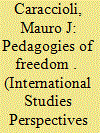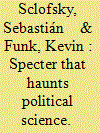|
|
|
Sort Order |
|
|
|
Items / Page
|
|
|
|
|
|
|
| Srl | Item |
| 1 |
ID:
157858


|
|
|
|
|
| Summary/Abstract |
The Arctic Council is the primary forum for fostering cooperation and addressing concerns in the Arctic, yet few know of its work. The Model Arctic Council (MAC) is a simulation of the Arctic Council designed to address this awareness deficit. It places graduate and undergraduate students in roles as Arctic Council delegates, challenging them to collaborate to tackle the Arctic’s most pressing issues. This article explains the MAC initiative and the MAC 2016 event held at the University of Alaska Fairbanks (UAF). It evaluates participants’ qualitative comments and survey responses from the MAC 2016 and finds that the program was effective in developing student knowledge of the Arctic; increasing student understanding of Arctic Council objectives and processes; preparing students for leadership roles in the circumpolar north; and encouraging student-faculty collaboration among University of the Arctic (UArctic) institutions. To improve future MAC programs, the organizing committee should strengthen the pre- and early program training sessions, clarifying Arctic Council processes and norms and stressing effective communication skills and cultural sensitivity.
|
|
|
|
|
|
|
|
|
|
|
|
|
|
|
|
| 2 |
ID:
157855


|
|
|
|
|
| Summary/Abstract |
This article contributes to calls for a reflexive ethnography of academic life by examining the relationship between exile and courage in the work of Paulo Freire. I turn to Freire’s experience of exile and the role it plays in his critical pedagogy in order to develop a reflexive framework linking scholarly encounters with global politics and different forms of courage. I begin my analysis with a portrait of Freire’s life and work, focusing on the distinct elements in his writing that contribute to what I call an exilic reflexivity. I then turn to Freire’s writing on conscientization, pedagogy, and the role of ideology in higher education to highlight missed opportunities by international relations (IR) scholarship to engage with alternative forms of existential courage. Freire’s approach to education offers IR scholars an opportunity to rethink exile in light of ongoing structural challenges within the political economy of academic life. While Freire was not an IR scholar as such, his work is positioned against similar economic, political, and ideological constraints on contemporary academia, conveying a pedagogy of freedom that remains highly relevant today.
|
|
|
|
|
|
|
|
|
|
|
|
|
|
|
|
| 3 |
ID:
157857


|
|
|
|
|
| Summary/Abstract |
In recent years, growing concern in international relations to offer a more inclusive and active learning experience has led to the increased use of practical exercises, visual teaching materials like movies and fictional television, as well as social media and e-learning tools. Despite noteworthy achievements in bridging the everyday lives of international relations students, these teaching contributions have yet to explore its potential more comprehensively. Students who prefer to learn through practical exercises still struggle to access the more abstract and theoretical topics of international relations, and the role of emotions for active learning remains underdeveloped. To provide a more inclusive international relations teaching that considers the requirements of all types of learners, to encourage students to rethink what is taken for granted in the discipline by exploring their emotions, and to promote discussions about issues that otherwise might have remained silenced, this article suggests that the introduction of a dance workshop into international relations curricula is beneficial for the learning experience of students. Modern, egalitarian dances like contact improvisation can be used to teach world politics in a different way, as students not only learn about its topics, but also perform them.
|
|
|
|
|
|
|
|
|
|
|
|
|
|
|
|
| 4 |
ID:
157856


|
|
|
|
|
| Summary/Abstract |
We compiled an original database of syllabi for introductory, graduate courses from top-ranked US departments to assess the extent to which elite international relations and comparative politics scholars engage with Marx. Analysis of those syllabi overwhelmingly demonstrates that even superficial engagement with Marx or the Marxist tradition is exceedingly rare. We argue that the reasons behind this near-total absence are more political than intellectual and include the embrace of the defeatist, neoliberal logic of the “end of history.” While mainstream disengagement from Marx is perhaps unsurprising, many “critical” political scientists also ignore and/or misread Marx, often because of his purported Eurocentrism. Though Marx’s writings at times evince ethnocentric biases, Marx engaged in extensive efforts to grapple with the specificity of the non-European world. Further, these critics fail to account for how thinkers around the globe have found value in and made theoretical contributions to the universalist Marxist story. We analyze two such cases: the African anticolonial leader Amílcar Cabral and the Peruvian Marxist theorist and activist José Carlos Mariátegui. We argue that this superficial engagement, misreading, and sometimes the outright ignoring of Marx hinders the discipline’s ability to address important real-world problems or theoretical debates, let alone make political science matter.
|
|
|
|
|
|
|
|
|
|
|
|
|
|
|
|
| 5 |
ID:
157854


|
|
|
|
|
| Summary/Abstract |
Anxieties regarding colonial and neoliberal education have generated multiple calls for critical international pedagogies. Scholars of critical pedagogy have analyzed the pedagogies of the neoliberal project, whose ethos and economic imperatives aim to produce apolitical consumers and future citizens. Such calls, this article argues, articulate a concern about other-regardedness, critiquing the impact of neoliberalism on the cultivation of student values and relations toward politics, society, and others. How can we articulate a critical international pedagogy informed by, and enhancing, students’ and future citizens’ other-regardedness toward those “superfluous” and “disposable” others outside the classroom and the formal curriculum? To this end, we mobilize Michel Foucault’s thinking of “counter-conduct” to illuminate how students resist being conducted as self-interested and apolitical consumers. Such practices remain largely unexplored in examinations of recent student protests and occupations. Examining the 2005 student occupation of a French university against the local government’s abandonment of asylum-seekers, we discuss students’ own processes of social participation and self-formation, thus exploring the possibilities and tensions for advancing a critical and other-regarding pedagogy. Greater attention to students resisting the historically blind and market-driven rationalities and techniques of governing—inside and outside classrooms and curricula—marks an important point of departure for critical pedagogies of the international.
|
|
|
|
|
|
|
|
|
|
|
|
|
|
|
|
|
|
|
|
|